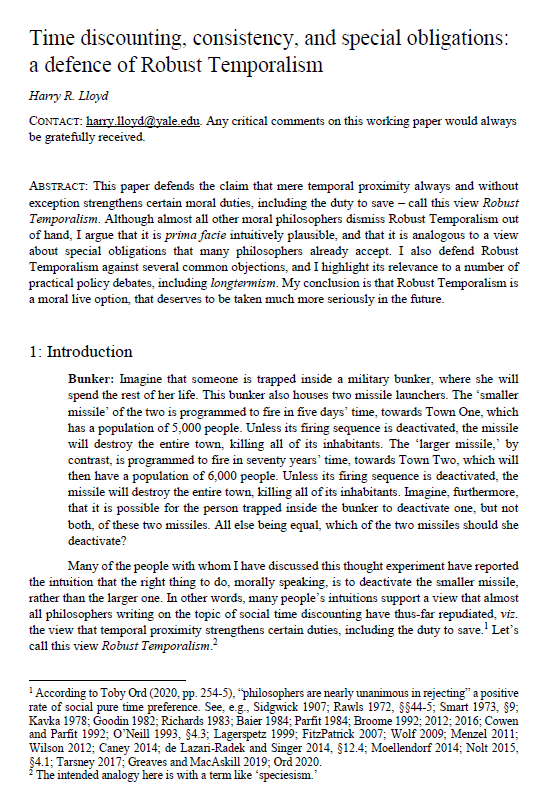Time discounting, consistency and special obligations: a defence of Robust Temporalism
Harry R. Lloyd (Yale University)
GPI Working Paper No. 11-2021
This is the winning entry of the Essay Prize for global priorities research 2021. The uploaded paper is the full, revised draft of the abridged paper submitted for the prize competition.
This paper defends the claim that mere temporal proximity always and without exception strengthens certain moral duties, including the duty to save – call this view Robust Temporalism. Although almost all other moral philosophers dismiss Robust Temporalism out of hand, I argue that it is prima facie intuitively plausible, and that it is analogous to a view about special obligations that many philosophers already accept. I also defend Robust Temporalism against several common objections, and I highlight its relevance to a number of practical policy debates, including longtermism. My conclusion is that Robust Temporalism is a moral live option, that deserves to be taken much more seriously in the future.
Other working papers
Desire-Fulfilment and Consciousness – Andreas Mogensen (Global Priorities Institute, University of Oxford)
I show that there are good reasons to think that some individuals without any capacity for consciousness should be counted as welfare subjects, assuming that desire-fulfilment is a welfare good and that any individuals who can accrue welfare goods are welfare subjects. While other philosophers have argued for similar conclusions, I show that they have done so by relying on a simplistic understanding of the desire-fulfilment theory. My argument is intended to be sensitive to the complexities and nuances of contemporary…
Intergenerational equity under catastrophic climate change – Aurélie Méjean (CNRS, Paris), Antonin Pottier (EHESS, CIRED, Paris), Stéphane Zuber (CNRS, Paris) and Marc Fleurbaey (CNRS, Paris School of Economics)
Climate change raises the issue of intergenerational equity. As climate change threatens irreversible and dangerous impacts, possibly leading to extinction, the most relevant trade-off may not be between present and future consumption, but between present consumption and the mere existence of future generations. To investigate this trade-off, we build an integrated assessment model that explicitly accounts for the risk of extinction of future generations…
The end of economic growth? Unintended consequences of a declining population – Charles I. Jones (Stanford University)
In many models, economic growth is driven by people discovering new ideas. These models typically assume either a constant or growing population. However, in high income countries today, fertility is already below its replacement rate: women are having fewer than two children on average. It is a distinct possibility — highlighted in the recent book, Empty Planet — that global population will decline rather than stabilize in the long run. …

